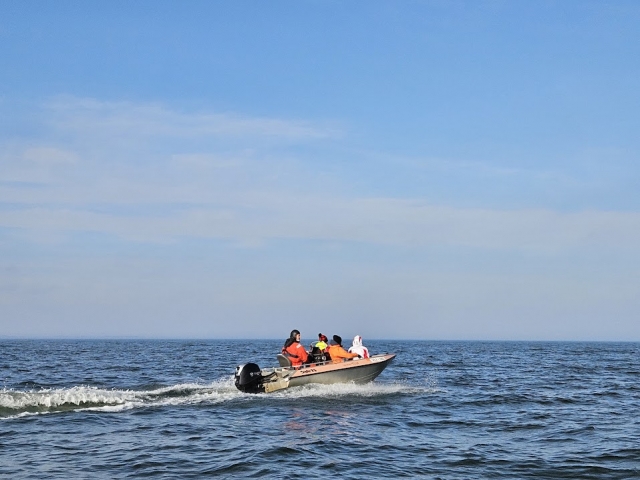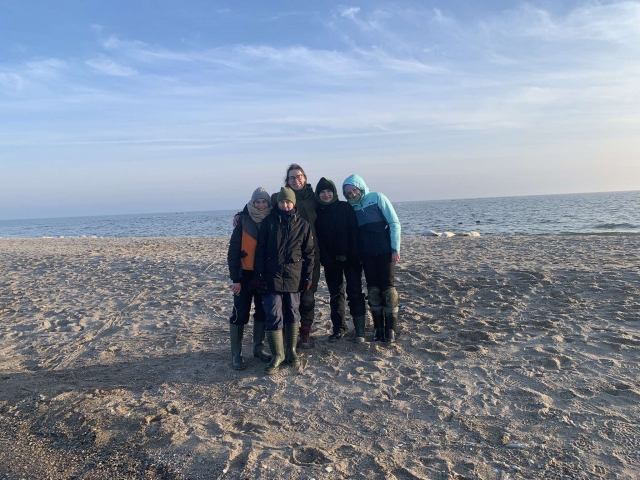Our research group is a part of the Department of Neurobiology and Biophysics at the Institute of Biosciences
The grey seal research group, led by Dr. Vaida Survilienė, conducts studies in several areas — grey seal health, immunology, and toxicology, as well as behavioural research.
Grey seal health, immunology and toxicology research
The Baltic Sea is characterized by extremely high levels of anthropogenic pollutants. Among them are polychlorinated biphenyls (PCBs), organochlorine pesticides (OCPs), and per- and polyfluoroalkyl substances (PFAS), also known as endocrine-disrupting chemicals (EDCs). These pollutants pose a serious threat to both human and wildlife health — they interfere with the immune and endocrine systems, and their effects are particularly harmful to top predators in the food web, such as marine mammals, which live in chronically contaminated ecosystems. However, there is still limited knowledge about how these endocrine-disrupting compounds affect the health, immune function, and development of seal pups during the early stages of life.
The aim of our research group is to better understand the impact of these pollutants on the physiological and immune development of seals, as well as their contribution to first-year pup mortality, especially in the context of climate change. We also hope that the results of our research will contribute to the development of more effective regulatory measures and help to better assess the potential health risks of pollution to humans — especially infants and children.
Fieldwork is conducted in Estonia, where we collect a variety of samples from grey seal pups using the most efficient methods available, minimizing disturbance to the seal haul-outs and reducing handling time with each pup. The team consists of an experienced joint group of researchers from Estonia and Lithuania.
Steroid Hormone Research
To better understand how environmental pollutants affect the development of grey seal pups, research team members Dr. Vaida Survilienė and master’s student Aistė Radzevičiūtė are analyzing steroid hormones in blood plasma and fur samples. The research is carried out in collaboration with scientists from the Faculties of Medicine and Chemistry at Vilnius University, as well as international partners at the University of Copenhagen and the Norwegian University of Science and Technology (NTNU). Advanced methods — including chromatography–mass spectrometry and ELISA — are used to identify a broad range of hormones. The samples and techniques used allow researchers to construct a comprehensive view of hormonal changes from prenatal development through the early postnatal period.
Immune System Research
Seals are exposed to various viruses through the food chain or contact with other animals — some of which are capable of infecting humans or are closely related to human viruses. Dr. Indrė Kučinskaitė-Kodzė, along with master’s student Tomas Vainauskas, is searching for antibodies specific to human viruses (e.g., influenza, COVID-19, mumps, measles) in the blood of seal pups. The presence of these antibodies indicates that the seals have already encountered these viruses. This study opens new perspectives on viral surveillance in seals and enhances understanding of their potential role in zoonotic transmission chains.
 |
 |
 |
 |
 |
 |
Grey seal behavioral research
Grey seal behaviour is diverse and subtle; it changes with age and across seasons, and is difficult to study due to the aquatic and remote lifestyle of these animals. Particularly little is known about the behaviour of young individuals, early pup development, and the effects of steroid hormones that influence the formation of the nervous, immune, and reproductive systems. Current research aims to evaluate changes in social behaviour and fluctuations in steroid hormone concentrations during the early ontogenetic period — from weaning to sexual maturity.
Reproductive Success and Studies in Natural Habitats
PhD student Laura Stukonytė is investigating the impact of climate change on the reproductive effort and success of Baltic grey seals. The study began in 2025 and will continue through 2027. During her research, Laura uses drones and stationary cameras to collect data from grey seal breeding colonies on the Saaremaa Islands in Estonia. These data will be combined with historical datasets gathered since 1991 by the partner organization ProMare. The study monitors female site selection for breeding, behavioural patterns, changes in the timing and duration of the breeding season, and how reproductive indicators depend on breeding site location and year.
Development of Social Behaviour in Grey Seals
Studying social behaviour and the factors influencing it during early development can help to better understand grey seal movement patterns in water and on land, group formation, the ability to recognize individuals, and behavioural changes as the pup grows. Since observing seals in the wild — especially in early developmental stages — is challenging, captive studies offer a valuable alternative. In collaboration with the Lithuanian Sea Museum and Klaipėda University, we aim to explore the role of socialization and the characteristics of social behaviour formation in developing grey seal pups during rehabilitation. These studies may contribute to improving welfare standards for seals kept in captivity.
 |
 |
 |
 |
 |
 |
